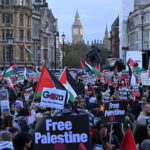CNN’s coverage of the Israel-Palestine conflict has come under scrutiny due to the news organization’s longstanding policy requiring journalists to submit their work for review by the bureau in Jerusalem before publication. This practice, aimed at ensuring accuracy in reporting on a polarizing subject, has raised concerns about the influence of Israel’s military censor on the news outlet’s coverage.
The Impact of Military Censorship:
CNN, like other foreign news organizations operating in Israel, must adhere to the rules set by the Israel Defense Forces (IDF) censor. The IDF censor dictates off-limits subjects for news organizations and can censor articles it deems unfit or unsafe to print. Recent restrictions imposed by the military censor, including limitations on reporting security cabinet meetings and information about hostages, highlight the challenges faced by journalists in navigating these constraints.
Internal Review and External Pressures:
While CNN’s policy doesn’t involve a direct review of every story by the military censor, it stands in contrast to approaches taken by other major news outlets that run sensitive stories through desks outside of Israel to avoid undue pressure. CNN’s Jerusalem bureau, operating under the shadow of the IDF censor, plays a significant role in shaping the network’s coverage.
Directives and Language Guidelines:
CNN’s recent directives to its staff on language usage in reporting on the Gaza Strip have sparked discussions about journalistic independence. Specific instructions regarding the description of the Ministry of Health in Gaza as “Hamas-controlled” and caution against relaying statements from Hamas reveal a level of editorial control that has raised eyebrows among media watchdogs.
Hiring Practices and Criticisms:
The hiring of a former soldier from the IDF’s Military Spokesperson Unit as a reporter during the conflict adds another layer of complexity. Critics argue that such appointments raise questions about objectivity and independence, particularly when reporting on a region fraught with geopolitical tensions.
Challenges and Impact on Reporting:
Insiders within CNN suggest that the internal review policy has demonstrably impacted coverage, with every line related to Israel-Palestine requiring approval from the Jerusalem bureau. This has led to nuanced editing favoring Israeli narratives, according to an anonymous source within CNN.
CNN’s approach to reporting on the Israel-Palestine conflict, while rooted in a desire for accuracy, raises important questions about journalistic independence, editorial control, and the influence of military censorship. As media organizations navigate the complex landscape of reporting in conflict zones, maintaining transparency and unbiased reporting becomes crucial for upholding the principles of journalism in the face of external pressures.



